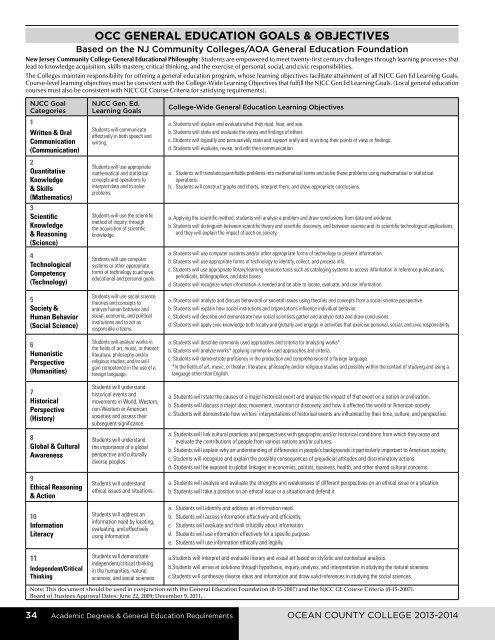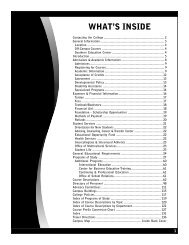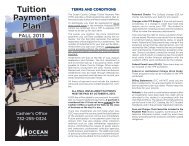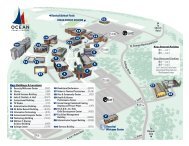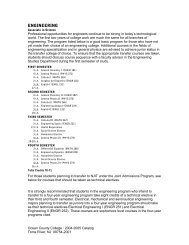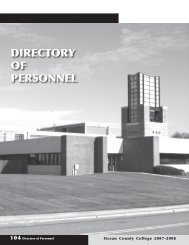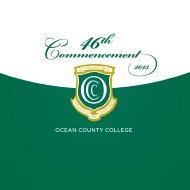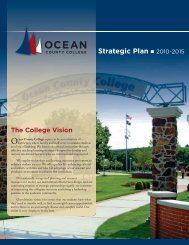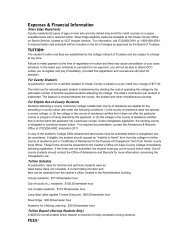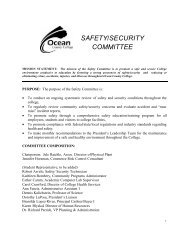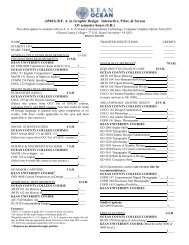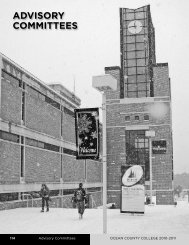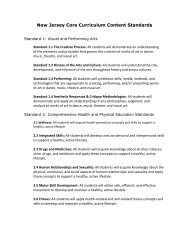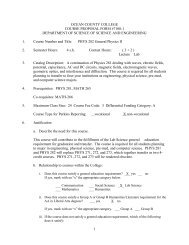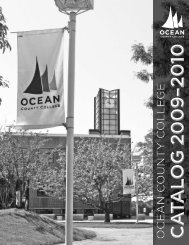current college catalog. - Ocean County College
current college catalog. - Ocean County College
current college catalog. - Ocean County College
You also want an ePaper? Increase the reach of your titles
YUMPU automatically turns print PDFs into web optimized ePapers that Google loves.
OCC General Education Goals & Objectives<br />
Based on the NJ Community <strong>College</strong>s/AOA General Education Foundation<br />
New Jersey Community <strong>College</strong> General Educational Philosophy: Students are empowered to meet twenty-first century challenges through learning processes that<br />
lead to knowledge acquisition, skills mastery, critical thinking, and the exercise of personal, social, and civic responsibilities.<br />
The <strong>College</strong>s maintain responsibility for offering a general education program, whose learning objectives facilitate attainment of all NJCC Gen Ed Learning Goals.<br />
Course-level learning objectives must be consistent with the <strong>College</strong>-Wide Learning Objectives that fulfill the NJCC Gen Ed Learning Goals. (Local general education<br />
courses must also be consistent with NJCC GE Course Criteria for satisfying requirements).<br />
NJCC Goal<br />
Categories<br />
1<br />
Written & Oral<br />
Communication<br />
(Communication)<br />
2<br />
Quantitative<br />
Knowledge<br />
& Skills<br />
(Mathematics)<br />
3<br />
Scientific<br />
Knowledge<br />
& Reasoning<br />
(Science)<br />
4<br />
Technological<br />
Competency<br />
(Technology)<br />
5<br />
Society &<br />
Human Behavior<br />
(Social Science)<br />
6<br />
Humanistic<br />
Perspective<br />
(Humanities)<br />
7<br />
Historical<br />
Perspective<br />
(History)<br />
8<br />
Global & Cultural<br />
Awareness<br />
9<br />
Ethical Reasoning<br />
& Action<br />
10<br />
Information<br />
Literacy<br />
11<br />
Independent/Critical<br />
Thinking<br />
NJCC Gen. Ed.<br />
Learning Goals<br />
Students will communicate<br />
effectively in both speech and<br />
writing.<br />
Students will use appropriate<br />
mathematical and statistical<br />
concepts and operations to<br />
interpret data and to solve<br />
problems.<br />
Students will use the scientific<br />
method of inquiry, through<br />
the acquisition of scientific<br />
knowledge.<br />
Students will use computer<br />
systems or other appropriate<br />
forms of technology to achieve<br />
educational and personal goals.<br />
Students will use social science<br />
theories and concepts to<br />
analyze human behavior and<br />
social, economic, and political<br />
institutions and to act as<br />
responsible citizens.<br />
Students will analyze works in<br />
the fields of art, music, or theater;<br />
literature; philosophy and/or<br />
religious studies; and/or will<br />
gain competence in the use of a<br />
foreign language.<br />
Students will understand<br />
historical events and<br />
movements in World, Western,<br />
non-Western or American<br />
societies and assess their<br />
subsequent significance.<br />
Students will understand<br />
the importance of a global<br />
perspective and culturally<br />
diverse peoples.<br />
Students will understand<br />
ethical issues and situations.<br />
Students will address an<br />
information need by locating,<br />
evaluating, and effectively<br />
using information.<br />
Students will demonstrate<br />
independent/critical thinking<br />
in the humanities, natural<br />
sciences, and social sciences<br />
<strong>College</strong>-Wide General Education Learning Objectives<br />
a. Students will explain and evaluate what they read, hear, and see.<br />
b. Students will state and evaluate the views and findings of others.<br />
c. Students will logically and persuasively state and support orally and in writing their points of view or findings.<br />
d. Students will evaluate, revise, and edit their communication.<br />
a. Students will translate quantifiable problems into mathematical terms and solve these problems using mathematical or statistical<br />
operations.<br />
b. Students will construct graphs and charts, interpret them, and draw appropriate conclusions.<br />
a. Applying the scientific method, students will analyze a problem and draw conclusions from data and evidence.<br />
b. Students will distinguish between scientific theory and scientific discovery, and between science and its scientific technological applications,<br />
and they will explain the impact of each on society.<br />
a. Students will use computer systems and/or other appropriate forms of technology to present information.<br />
b. Students will use appropriate forms of technology to identify, collect, and process info.<br />
c. Students will use appropriate library/learning resource tools such as <strong>catalog</strong>ing systems to access information in reference publications,<br />
periodicals, bibliographies, and data bases.<br />
d. Students will recognize when information is needed and be able to locate, evaluate, and use information.<br />
a. Students will analyze and discuss behavioral or societal issues using theories and concepts from a social science perspective.<br />
b. Students will explain how social institutions and organizations influence individual behavior.<br />
c. Students will describe and demonstrate how social scientists gather and analyze data and draw conclusions.<br />
d. Students will apply civic knowledge both locally and globally and engage in activities that exercise personal, social, and civic responsibility.<br />
a. Students will describe commonly used approaches and criteria for analyzing works*.<br />
b. Students will analyze works* applying commonly used approaches and criteria.<br />
c. Students will demonstrate proficiency in the production and comprehension of a foreign language.<br />
*In the fields of art, music, or theater; literature; philosophy and/or religious studies and possibly within the context of studying and using a<br />
language other than English.<br />
a. Students will state the causes of a major historical event and analyze the impact of that event on a nation or civilization.<br />
b. Students will discuss a major idea, movement, invention or discovery, and how it affected the world or American society.<br />
c. Students will demonstrate how writers’ interpretations of historical events are influenced by their time, culture, and perspective.<br />
a. Students will link cultural practices and perspectives with geographic and/or historical conditions from which they arose and<br />
evaluate the contributions of people from various nations and/or cultures.<br />
b. Students will explain why an understanding of differences in people’s backgrounds is particularly important to American society.<br />
c. Students will recognize and explain the possible consequences of prejudicial attitudes and discriminatory actions.<br />
d. Students will be exposed to global linkages in economics, politics, business, health, and other shared cultural concerns.<br />
a. Students will analyze and evaluate the strengths and weaknesses of different perspectives on an ethical issue or a situation.<br />
b. Students will take a position on an ethical issue or a situation and defend it.<br />
a. Students will identify and address an information need.<br />
b. Students will access information effectively and efficiently.<br />
c. Students will evaluate and think critically about information.<br />
d. Students will use information effectively for a specific purpose.<br />
e. Students will use information ethically and legally.<br />
a..Students will interpret and evaluate literary and visual art based on stylistic and contextual analysis.<br />
b..Students will arrive at solutions through hypothesis, inquiry, analysis, and interpretation in studying the natural sciences.<br />
c..Students will synthesize diverse ideas and information and draw valid inferences in studying the social sciences.<br />
Note: This document should be used in conjunction with the General Education Foundation (8-15-2007) and the NJCC GE Course Criteria (8-15-2007).<br />
Board of Trustees Approval Dates: June 22, 2009; December 9, 2011.<br />
34 Academic Degrees & General Education Requirements<br />
<strong>Ocean</strong> <strong>County</strong> <strong>College</strong> 2013-2014


